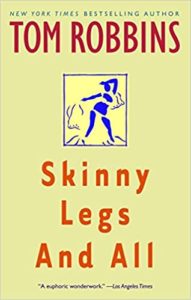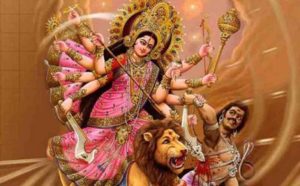 Are you looking for some crazy fun yet soul-satisfying summer reading? Something to take your mind off your isolation in these dark and troubled times? If so, try Skinny Legs and All.
Are you looking for some crazy fun yet soul-satisfying summer reading? Something to take your mind off your isolation in these dark and troubled times? If so, try Skinny Legs and All.
When my friend, Bud, introduced me to Tom Robbins in the early nineties, this was the book he recommended. I had studied Jungian psychology for several years and my first book about my search for self-knowledge and spiritual meaning had recently been published. It was a good thing I didn’t find Robbins before then. Reading his original treatment of similar themes before writing my own would have been so intimidating I might not have dared try! This man writes like an angel! He said everything I wanted to say—especially about women and the Divine Feminine—and in such an insightful, entertaining way.
The genius of this Trickster/Philosopher is his whimsical treatment of the big questions about the mystery of life. He is to European Americans what Brer’ Rabbit was to early Black Americans, Coyote to the Apache and the Sioux, Anansi to the Ashante, Prometheus to the Greeks, and Maui to the Polynesians.
Imagine this if you will: an Arab and a Jew open a restaurant together in New York City across the street from the United Nations. Sounds like the beginning of a joke, doesn’t it? But there’s more. The bizarre cast of characters includes a philosophizing bean can, a mysterious dessert spoon, a painted stick, a conch shell, a dirty sock, a waitress and artist named Ellen Cherry, her Bible thumping uncle, the Reverend Buddy Winkler, her big-hearted, beer-guzzling husband, Boomer, a street performer named Turn Around Norman who does his thing on the sidewalk south of St. Patrick’s Cathedral, and a Jewish/Arab girl named Salome who stupefies and enlightens her audience with a dance of the seven veils that reads like a hallucinatory acid trip.
 A bit of a fanatic with some trickster thrown in, Robbins conveys his unconventional perspectives on religion, politics, gender, race, art, sex, marriage and the human comedy in an outrageous plot that approaches the mythical. In that tradition he balances humanity’s virtues with our ignorant shadows without coming off judgmental. Somehow he even manages to gain the reader’s sympathy for his less likable characters.
A bit of a fanatic with some trickster thrown in, Robbins conveys his unconventional perspectives on religion, politics, gender, race, art, sex, marriage and the human comedy in an outrageous plot that approaches the mythical. In that tradition he balances humanity’s virtues with our ignorant shadows without coming off judgmental. Somehow he even manages to gain the reader’s sympathy for his less likable characters.
I found Robbins’ philosophic musings fascinating and his characters refreshingly complex. His writing is so packed with metaphors and his plots with absurdities that sometimes I get on overload and have to put his books down. Still, it’s never long before I return for more. When a book of his sits unfinished on my bedside table it feels like I’m ignoring a living thing. I can’t not read it no matter how problematic it might occasionally be. And I’m always sorry when it’s over.
For me, the strength of this book is not the plot, characters, setting, or even the writing style. It’s the author’s reverential wonderment for life’s endless vagaries, paradoxes and puzzles combined with his refusal to make black and white judgments about them. This is a man who has called on the power of the Goddess Durga to help him overcome his demons. Happily for us all, he has survived to tell the tale. And what a tale he tells.
“Life is a delicious mystery to be passionately savored,” is the message that shines through every page. “Your purpose is to partake of it with every cell of your body, love with every breath, and awaken your true and infinitely lovable self,” I hear him saying. I may never get there but I intend to keep trying until I graduate from Earth School.
 Skinny Legs and All is a wacky novel, and Robbins, a very gifted writer. But if his books are authentic reflections of who he really is, he’s on to something far deeper than silliness and window dressing. To me, he feels like a Holy Fool.
Skinny Legs and All is a wacky novel, and Robbins, a very gifted writer. But if his books are authentic reflections of who he really is, he’s on to something far deeper than silliness and window dressing. To me, he feels like a Holy Fool.
Revisiting this book whets my appetite for more Robbins, so I’ve just ordered two titles I haven’t read yet: Fierce Invalids Home From Hot Climates, and his autobiographical Tibetan Peach Pie: A True Account of An Imaginative Life. What have you read that sings your soul’s song? What do you plan to read this summer?
Image Credits: Amazon, News Nation English, Image Journal.
Jean Raffa’s The Bridge to Wholeness and Dream Theatres of the Soul are at Amazon. E-book versions are also at Kobo, Barnes And Noble and Smashwords. Healing the Sacred Divide can be found at Amazon and Larson Publications, Inc. Watch for her new book, The Soul’s Twins, to be launched by Schiffer Publishing this October.




4 Responses
Thank you, Jean! I look forward to trading the
Tom Robbins book! Sandra Blossey
Hi Sandra. I hope you got the response I wrote to your email. For some reason, I didn’t get your comment on my blog. I’m glad you liked it and hope all is well with you! Jeanie
I’ve never read Tom Robbins Jeanie. He sounds up my street. I’ve had a quick look at some of his other titles (very imaginative) and content. A Holy Fool indeed! I’ve got quite a few books on my Kindle, plus some others on my bookshelf that I’m dying to re-read. Am JUST about finished with Wally Lamb: The Hour I First Believed, a re-read. Heavy going but worthwhile and I’ll be glad when I’m finally done with it. Whatever reading I’ll be doing next will be winter reading which hasn’t quite set in yet.
Hope this finds you and family well 🙂 xx
Oops! That’s right. Sometimes I forget our seasons are opposites! I’ve read a Wally Lamb book, but not this one.
Right now I’m reading a new edition of The Sunflower by Simon Wiesenthal for my book group. It’s about the holocaust. Dear God! He tells a true story about when a dying young SS officer asks him to forgive him then asks the reader, “What would you have done?” That story is followed by opinions of several religious leaders and scholars from all over the world. Talk about heavy! It’s incredibly heavy reading and very morally challenging. But that’s just what I like in a book. -)
We are well. Hope you and yours are too! Happy winter, Jeanie